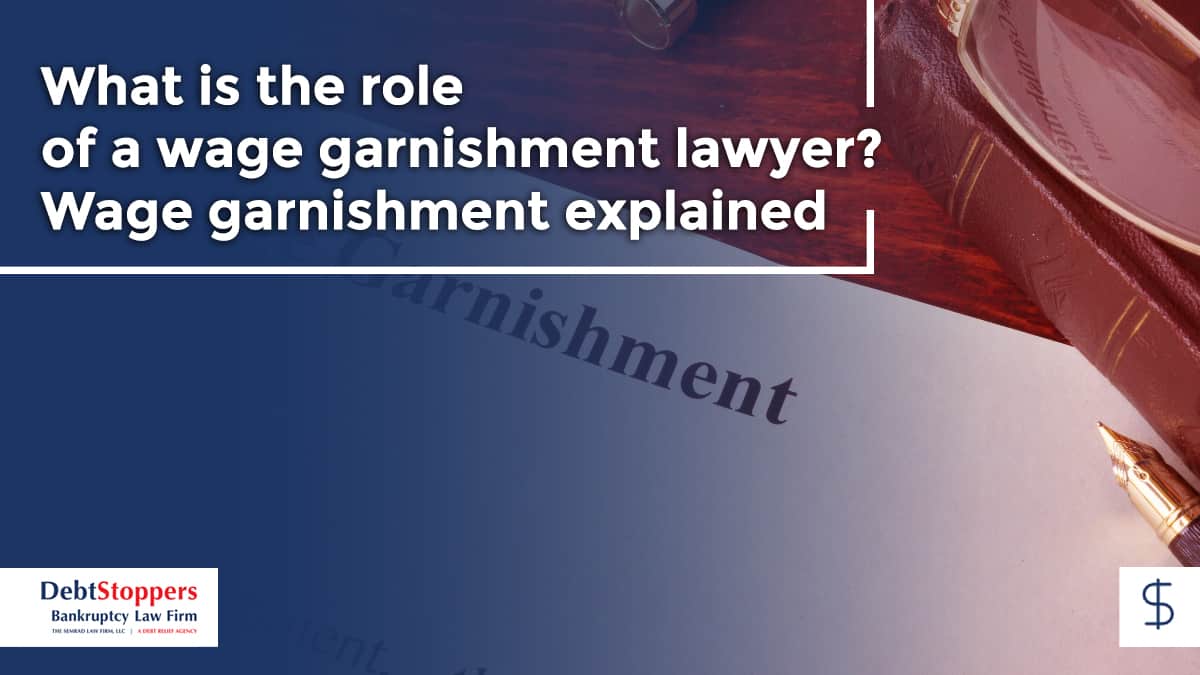What is the role of a wage garnishment lawyer? Wage garnishment explained

If you fear your wages may be garnished or you are already experiencing wage garnishment, an experienced wage garnishment lawyer, also called a consumer protection attorney, can help you navigate this journey and ensure your rights are protected.
You may need a wage garnishment lawyer** in several situations, especially if the garnishment is causing financial hardship, was improperly handled, or if you are unsure about your rights.
A wage garnishment lawyer can help you understand the legal process, protect your rights, and possibly reduce or eliminate the garnishment. Here are the main circumstances when hiring a wage garnishment lawyer is advisable. Forest, if the garnishment is causing financial hardship, you have multiple garnishments, or the garnishment was improperly handled.
If you are facing significant wage garnishment and overwhelming debt, bankruptcy may be your best option. A lawyer can help determine if bankruptcy is right for you and guide you through the process.
What is wage garnishment?
Wage garnishment is a legal process that allows a creditor to obtain a court order to deduct a portion of a person’s wages directly from their paycheck to repay a debt.
It is typically used when a person has failed to pay debts, such as credit card debt, medical bills, child support, student loans, or taxes. Wage garnishment should be used as a last resort by creditors to recover money when other attempts to collect the debt have failed.

How Does Wage Garnishment Work?
Wage garnishment allows creditors to collect unpaid debts by deducting a portion of your wages directly from your paycheck.
A certain amount is withheld and sent to the creditor until the debt is repaid or the wage garnishment order is lifted.
Before wages can be garnished, a creditor must first sue the debtor in court to obtain a judgment, except in cases like unpaid taxes, federal student loans, or child support, where garnishment can occur without a court order. If the court rules in favor of the creditor, a wage garnishment order is issued, requiring the employer to withhold a portion of the debtor's wages.
Once the court order is issued, the debtor’s employer is notified and required to start withholding the specified amount from each paycheck. The employer then sends the garnished amount directly to the creditor until the debt is paid or the garnishment order is lifted.
Wage garnishment process
The wage garnishment process involves a series of legal steps that allow creditors to collect a portion of your wages to pay off a debt. This typically happens after other debt collection attempts have failed. Wage garnishment is regulated by both federal and state laws, which set limits on how much of your income can be garnished and under what circumstances.
Before wage garnishment begins, you must have an unpaid debt that the creditor has attempted to collect through phone calls, letters, and negotiating payment plans.
If you do not pay the debt, the creditor can file a lawsuit to recover the money. You will be served a summons, informing you that you are being sued for the unpaid debt. The summons provides a court date and explains the creditor’s claim.
After obtaining the court judgment, the creditor can request a wage garnishment order. Your employer will receive the wage garnishment order from the court or creditor, notifying them of the amount to be withheld from your paycheck.
Once your employer receives the garnishment order, they must legally comply. The employer will begin withholding the specified portion of your wages from each paycheck. The employer sends the garnished portion of your wages directly to the creditor. The wage garnishment will continue until the debt is completely paid off or the garnishment is otherwise stopped.
Maximum amount
There are federal and state limits on how much of your wages can be garnished. Federal law limits garnishment for general debts to 25% of your disposable earnings (the amount left after taxes and legally required deductions) or the amount by which your weekly earnings exceed 30 times the federal minimum wage, whichever is less. For child support and alimony, up to 50% of disposable earnings if you’re supporting another spouse or child, or up to 60% if you are not.
State law may provide additional protections by setting lower garnishment limits or exemptions, so it’s important to check your state’s rules or consult an experienced wage garnishment attorney who can help you understand your rights and options.
Role of the employer
Once your employer receives a wage garnishment order, they are legally required to withhold the specified amount from your wages and send it to the creditor. Employers must comply with the garnishment order, and they are prohibited from firing or retaliating against an employee solely because of wage garnishment for one debt.

How can a wage garnishment lawyer help?
Consulting with a wage garnishment lawyer, bankruptcy attorney, or consumer protection lawyer can help you navigate wage garnishment issues and protect your rights.
Role of wage garnishment lawyers
An experienced attorney can help you file a claim of exemption with the court if the garnishment is causing financial hardship; if successful, this could reduce or eliminate the garnishment amount. Common exemptions include needing wages to cover basic living expenses like housing, utilities, or groceries.
Alternatively, an attorney can help you challenge the garnishment if you believe it is not valid or the amount being garnished exceeds the legal limit.
An attorney can also help you determine if bankruptcy is your best course of action. If so, an attorney can help you file for Chapter 7 or Chapter 13 bankruptcy, which will immediately halt wage garnishment through the automatic stay.
When do you need a wage garnishment lawyer?
You may need a wage garnishment lawyer if you're facing wage garnishment and need legal assistance to protect your rights, challenge the garnishment, or explore options to reduce or stop it.
Hiring a wage garnishment lawyer is essential when you are facing financial hardship, believe the garnishment is being improperly handled, or need help navigating complex debt situations such as multiple garnishments or specific types of debts.
Even in less extreme circumstances, a lawyer can assist in reducing, stopping, or challenging the garnishment, as well as explore options like bankruptcy or debt settlement to resolve your financial situation more effectively. If you’re unsure about your rights or how to handle wage garnishment, consulting a lawyer can give you peace of mind and protect your income.
What is a wage garnishment reimbursement and how can a lawyer help with it?
Wage garnishment reimbursement occurs when wages were wrongfully garnished or taken in excess of the legal limits, and the debtor is entitled to get that money back. This may happen if the garnishment process was mishandled, the debt was already paid, the creditor didn’t follow legal procedures, or the amount garnished exceeded what is allowed under federal or state law.
If any of these situations occur, you may be eligible for a reimbursement of the wages that were wrongfully withheld a lawyer can help you determine if you are owed a reimbursement and file a motion to stop or reverse the garnishment and request a reimbursement of the wrongly garnished wages. T
If the creditor refuses to reimburse the wrongfully garnished wages, your lawyer can file a lawsuit in court to recover the improperly garnished funds. A court may order the creditor to return the money, including potential interest or damages, if it’s proven that the garnishment violated the law.
If the issue goes to court, your lawyer will represent you, present your case, and argue that the wages were wrongfully garnished. The lawyer will help you file the necessary paperwork, gather evidence, and follow the proper legal process to obtain reimbursement. A lawyer can explain your legal rights regarding wage garnishment and reimbursement, including federal and state protections.
Furthermore, if you’ve filed for Chapter 7 or Chapter 13 bankruptcy, an automatic stay goes into effect, halting all collection activities, including wage garnishment. If wages were garnished after the stay was in place, you may be entitled to a reimbursement.





